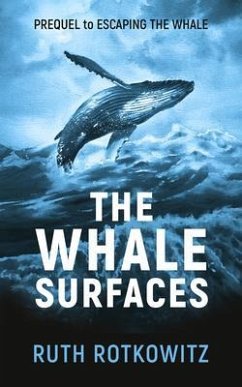The romanticized picture of childhood as a time of carefree innocence, of golden sunshine and worry-free bliss can be a dangerous illusion. In The Whale Surfaces, author Ruth Rotkowitz holds a microscope to those idealized years in the life of the protagonist she created in her debut novel, Escaping the Whale. This microscope, at times, becomes a sledgehammer.
Marcia Gold is the daughter of Holocaust survivors whose lives have been defined by their painful experiences in Europe. A sensitive child, Marcia has absorbed this history as her own, and the Holocaust looms over her childhood like an ever-present cloud. Despite caring parents and a safe life, Marcia's childhood is filled with panic and delusions.
Marcia realizes early on that her fearful imaginings are upsetting to others. Yet demons are haunting her and she feels them infiltrating her life, making her 'different.' No one can understand her sense of alienation and her frightening 'visions.' Mortified by them herself, she believes her only hope lies in escaping the scene of her childhood and beginning an independent life. Only then, she concludes, will she vanquish those demons whose tentacles seem to be sliding relentlessly through the inside of her brain, poisoning all that they touch. Marcia's search for independence is really a search for mental health. Read after Escaping the Whale, the prequel explains Marcia's journey to adulthood. Read as a stand-alone, it provides a picture of a child struggling to be 'normal.' Marcia Gold, in both books, is waiting to be understood.¿
Marcia Gold is the daughter of Holocaust survivors whose lives have been defined by their painful experiences in Europe. A sensitive child, Marcia has absorbed this history as her own, and the Holocaust looms over her childhood like an ever-present cloud. Despite caring parents and a safe life, Marcia's childhood is filled with panic and delusions.
Marcia realizes early on that her fearful imaginings are upsetting to others. Yet demons are haunting her and she feels them infiltrating her life, making her 'different.' No one can understand her sense of alienation and her frightening 'visions.' Mortified by them herself, she believes her only hope lies in escaping the scene of her childhood and beginning an independent life. Only then, she concludes, will she vanquish those demons whose tentacles seem to be sliding relentlessly through the inside of her brain, poisoning all that they touch. Marcia's search for independence is really a search for mental health. Read after Escaping the Whale, the prequel explains Marcia's journey to adulthood. Read as a stand-alone, it provides a picture of a child struggling to be 'normal.' Marcia Gold, in both books, is waiting to be understood.¿
Dieser Download kann aus rechtlichen Gründen nur mit Rechnungsadresse in A, D ausgeliefert werden.









